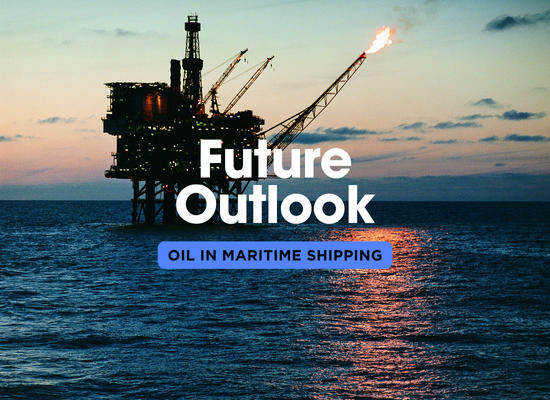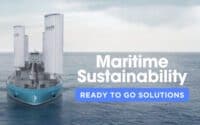The Future of Oil in Maritime Shipping

The maritime shipping industry has long been reliant on oil as its primary fuel source. However, the landscape is rapidly changing due to technological advancements, environmental regulations, and evolving market dynamics. As we look ahead, it's essential to consider how oil's role in maritime shipping will evolve over the coming decades. Today we will explore the future of oil in maritime shipping from the 2020s to the 2050s and beyond, examining factors such as demand, the rise of alternative fuels, cost implications, and the impact of climate change.
Disclaimer: This information is derived from current statistics and trends. The future outlook presented in this article is speculative and could range from fairly accurate to significantly off the mark. Always consider multiple sources and consult experts when planning for the future.
2020s: The Transition
Demand and Usage:
In the 2020s, oil continues to be the dominant fuel in maritime shipping. However, the demand for cleaner and more sustainable alternatives is growing. Stricter environmental regulations, such as the International Maritime Organization's (IMO) 2020 sulfur cap, have forced shipowners to seek low-sulfur oil options or install exhaust cleaning systems (scrubbers). This decade marks the beginning of a significant transition towards more environmentally friendly fuels.
Alternative Fuels and Renewable Energy:
Liquefied Natural Gas (LNG) gains traction as a cleaner alternative to oil. LNG produces lower sulfur oxide (SOx), nitrogen oxide (NOx), and carbon dioxide (CO2) emissions compared to traditional marine oil. Methanol and biofuels also start to see increased adoption, particularly in regions with stringent emission regulations. Hybrid systems combining oil with batteries or other renewable energy sources, such as wind and solar power, are being explored for short-sea shipping and coastal operations. Wind-assisted propulsion, using modern sails or kite systems, and solar panels for auxiliary power are becoming more common.
Cost Implications:
The cost of oil remains relatively stable but fluctuates due to global market dynamics. The initial investment in alternative fuels and technologies is high, but operational costs can be lower in the long run due to reduced fuel consumption and compliance with emission regulations. Shipowners are weighing the financial benefits of retrofitting existing vessels versus investing in new, more efficient ships.
Impact of Climate Change:
Climate change drives the industry to prioritize sustainability. The melting of polar ice caps opens new shipping routes, such as the Northern Sea Route, potentially reducing travel distances and fuel consumption. However, the environmental impact of increased shipping traffic in these sensitive areas is a growing concern. Additionally, the maritime industry is under pressure to reduce its carbon footprint, encouraging investment in cleaner technologies and alternative fuels.
2030s: The Era of Diversification
Demand and Usage:
The 2030s could witness a continued decline in the use of traditional oil as alternative fuels become more mainstream. The demand for low-sulfur oil options might persist, but the overall market share of oil could diminish. Shipping companies may diversify their fuel portfolios, integrating multiple fuel types to meet regulatory requirements and market demands.
Alternative Fuels and Renewable Energy:
LNG might remain a popular choice, but the focus could shift towards even cleaner options like hydrogen and ammonia. These fuels, when produced using renewable energy, offer zero-emission solutions. Battery technology could advance significantly, enabling more widespread use of hybrid and fully electric propulsion systems, especially for short-haul routes. Wind and solar power could play a more prominent role, with wind-assisted propulsion and solar panels becoming standard features on new vessels.
Cost Implications:
The cost of oil could rise due to increased taxes and levies aimed at reducing carbon emissions. However, the long-term financial benefits of investing in alternative fuels and advanced propulsion technologies might become more apparent. Operational savings from improved fuel efficiency and reduced emissions compliance costs could offset initial investments.
Impact of Climate Change:
Climate change could continue to drive the industry towards sustainability. The melting of polar ice caps might open new shipping routes, such as the Northern Sea Route, potentially reducing travel distances and fuel consumption. However, the environmental impact of increased shipping traffic in these sensitive areas could remain a significant concern, prompting stricter environmental protections and regulations.
2040s: The Decade of Innovation
Demand and Usage:
By the 2040s, the demand for oil in maritime shipping could see a substantial decline. The shipping industry might heavily favor alternative fuels, and oil could become a niche choice for specific types of vessels or routes where alternative fuels are less viable. The use of oil could be primarily limited to older ships that have not yet been retrofitted or replaced.
Alternative Fuels and Renewable Energy:
Hydrogen and ammonia could become the predominant fuels for maritime shipping, supported by widespread infrastructure and technological advancements. Synthetic fuels, produced using renewable energy, might also gain traction, providing a carbon-neutral alternative to traditional oil. Battery-electric propulsion systems could become more common, especially in coastal and short-sea shipping. Wind and solar power could be extensively integrated into ship designs, further reducing reliance on fossil fuels.
Cost Implications:
The cost of oil could continue to rise due to dwindling demand and increased production costs. Conversely, the cost of alternative fuels and technologies might decrease as they become more widely adopted and production scales up. The financial benefits of using cleaner fuels could become even more significant, with reduced operational costs and compliance with stricter environmental regulations.
Impact of Climate Change:
Climate change could have fundamentally altered the shipping industry by the 2040s. Rising sea levels and changing weather patterns might alter shipping routes and port infrastructure. The industry could face increased scrutiny and regulation, pushing for innovations that minimize environmental impact and improve resilience to climate-related challenges. Ships could be designed to be more energy-efficient and environmentally friendly, leveraging renewable energy sources like wind and solar to power their operations.
2050s: The Era of Sustainability
Demand and Usage:
By the 2050s, oil could become a minor player in the maritime fuel market. Most ships might operate on advanced alternative fuels or fully electric systems. The remaining oil-powered vessels could be phased out or converted to use cleaner fuels. The industry could be dominated by zero-emission ships, reflecting the significant technological and regulatory advancements made over the previous decades.
Alternative Fuels and Renewable Energy:
Hydrogen and ammonia could be the primary fuels, with widespread adoption across the global fleet. Advanced synthetic fuels and biofuels might provide additional options, particularly for specialized applications. Fully electric ships could become commonplace, especially for short and medium-distance routes. Innovations in fuel cell technology and renewable energy integration could drive the industry towards complete sustainability. Wind and solar power, alongside energy storage systems, could provide a significant portion of the energy required for maritime operations.
Cost Implications:
The cost dynamics of maritime fuels could shift significantly, with alternative fuels becoming more economical due to large-scale production and technological improvements. Oil could be prohibitively expensive, both in terms of direct costs and regulatory penalties. The financial landscape might favor ships that are energy-efficient and compliant with the highest environmental standards, offering substantial long-term savings.
Impact of Climate Change:
Climate change could have fundamentally transformed the shipping industry by the 2050s. Sea levels might have risen significantly, necessitating major changes in port infrastructure and shipping routes. The industry could be at the forefront of climate adaptation and mitigation efforts, leveraging new technologies to reduce emissions and enhance resilience. Environmental sustainability might be the cornerstone of maritime operations, driven by both regulatory mandates and market forces.
| ShipUniverse: Estimated Oil Usage in Global Shipping (in Million Metric Tons) | ||
|---|---|---|
| Decade | Estimated Oil Usage (Million Metric Tons) | Notes |
| 2020s | 300 | Baseline usage with gradual adoption of alternative fuels like LNG and biofuels, and hybrid systems including wind and solar. |
| 2030s | 250 | Increased adoption of LNG, biofuels, hydrogen, ammonia, and hybrid systems with wind and solar power integration. |
| 2040s | 150 | Significant shift towards hydrogen, ammonia, electric systems, and extensive use of wind and solar power. |
| 2050s | 50 | Majority of fleet using alternative fuels and renewable energy including wind and solar power. |
| 2060s+ | 20 | Minimal oil usage, primarily in legacy systems and specialized applications, with dominant use of wind and solar power. |
The future of oil in maritime shipping appears to be one of gradual decline, influenced by increasing environmental regulations, technological advancements, and market dynamics. From the transition phase of the 2020s to the innovation-driven 2040s and the sustainable 2050s, the maritime industry is poised to embrace cleaner, more efficient fuels. As we look beyond the 2050s, the legacy of oil could serve as a reminder of the industry's journey towards sustainability, highlighting the importance of innovation and adaptability in addressing global challenges. Wind and solar power, along with other renewable energy sources, will play a crucial role in shaping a greener and more sustainable future for maritime shipping.

Do you have a Maritime Product or Service that may be of interest to Shipowners? Tell us about it here!
Do you have feedback or insights? Please reach out to editor @ shipuniverse.com



